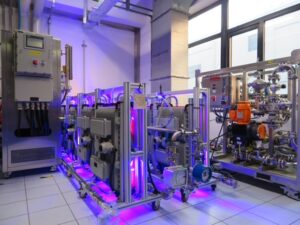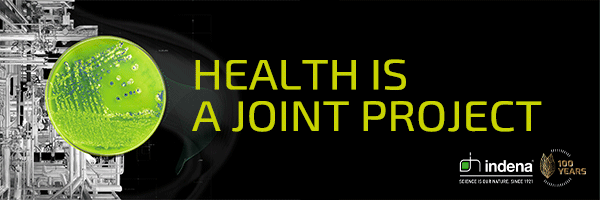Pharmaceuticals
Sustainable API manufacture through continuous flow chemistry 19th July 2022

Continuous manufacturing will enable the sustainable production of Active Pharmaceutical Ingredients.
Sustainability drives, combined with initiatives to reduce environmental burden and carbon footprint via innovations, are now underway in most industries. Globally, we are exploring innovative manufacturing technologies to improve environmental sustainability while enabling innovators in the pharmaceutical industry to bring more new drugs to patients. Despite a historically slow speed of change due to its highly regulated nature, the pharmaceutical industry is highly visible in adopting sustainable practices and green technologies. One such technology in the manufacturing of Active Pharmaceutical Ingredients (APIs) is Continuous Manufacturing (CM), which is also known as continuous processing or continuous flow chemistry.
Although continuous manufacturing has been used for more than a century in the chemical industry, it remains under-utilised for pharmaceutical production. It is well- known for its benefits in safety, speed and cost-efficiency. More importantly, flow chemistry is aligned with improved quality via good process controls and the design of experimental concepts.
In this article, I’d like to share some real-world applications and case studies demonstrating our efforts at WuXi STA to develop sustainable processes for API production using continuous manufacturing.
The expertise of experienced CDMO partners matters
Historically, there has been a reluctance amongst innovative pharmaceutical companies to use continuous manufacturing, as it has been perceived as highly resource-intensive, technically challenging and also presenting a potential regulatory risk. Now, however, these perceptions are being changed, thanks in part to its successful implementation of many clinical-stage and commercial products. Another reason for the perception shift is the successful experience from CDMO companies in advancing chemical pathways using continuous manufacturing. WuXi STA has been developing continuous manufacturing processes with our customers for the past nine years and has established continuous processing platforms supporting both process development and manufacturing, under both non-GMP and cGMP conditions, for projects from pre-clinical to commercial stages. Our flow chemistry team has more than 100 dedicated scientists and engineers working on real-world projects every day. We are currently operating more than 15 continuous manufacturing lines in both our Changzhou and Jinshan sites. By the end of 2022, we plan to expand to 30 lines, including more than ten lines dedicated to commercial-scale manufacturing. With growing capability and capacity, we can develop more product-appropriate synthetic routes involving flow chemistry and offering shorter timelines every year.
Continuous manufacturing in CDMOs as a Green Chemistry enabler
Our approach is built upon a number of key principles to ensure that flow chemistry creates value with both clinical and commercial manufacturing for a specific project, and this technology is quickly applied in API manufacturing without compromising the overall project timeline. Our pragmatic approaches to achieving this goal include process data mining from our living continuous process database, modularisation of continuous manufacturing equipment, setting up phase-appropriate goals and standardisation of manufacturing protocols. Our facilities accommodate various kinds of reactor skids for handling different types of reactions (liquid phase, solid-liquid, gas-liquid and gas-solid-liquid) and can offer a rich inventory of reactors modules with different throughputs.
The industry has made significant developments in flow chemistry capabilities in recent years; however, most companies only apply the technology to reactions involving unstable or highly active intermediates, extreme reaction conditions requiring high pressure and/or temperature or reactions that are not safe in batch mode.
We have taken our continuous manufacturing expertise one step further: we have developed more novel applications to improve the sustainability of API manufacturing. These include the kilogram to the commercial-scale application of photo reactions such as photo halogenation, photo redox, cyclisation, and trifluoromethylation, where the challenging chemical transformations were achieved with improved energy efficiency. We have also undertaken flow hydrogenation for de-benzylation, nitro reduction and CN/pyridine reduction. The relevant sustainability merits achieved herein include the reduced use of catalysts and solvents, smaller equipment footprint, improved safety and less batch failure due to the small scale-up effect. Recently, we were successful in improving the efficiency of enzymatic reactions such as transamination, also by continuous manufacturing, and the green power of biocatalysis and continuous manufacturing being synergised in a single chemical step. To put this in perspective, in 2021, we manufactured more than 150 compounds with a variety of reactions.
Case studies
One noteworthy case study is where we achieved benzylic bromination via a photo flow process. Using flow chemistry, we successfully removed an explosive radical initiator from the reaction, replaced the 45oC heating requirement with blue light irradiation at room temperature and eliminated the use of environmentally unfavourable solvent 1,2-dichloroethane. The process is safer, greener and better. The yield rose from 77% to 95% and Process Mass Intensity (PMI), the ratio of accumulated kilogram quantities of materials per kilogram of isolated product, dropped from 63 to 23.
In another case study, the original process included multiple cryogenic reactions with very tight material specifications and a very narrow process parameter window. With flow chemistry, we enabled the scale-up of Michael addition and Dieckmann cyclisation and successfully replaced the challenging cryogenic reactions. As a result, the process was more robust and the production time was reduced.
Perhaps the most impressive aspect is that within a short period of five months,
we were able to finalise the processes from the above two cases and applied them to the API manufacturing for New Drug Application (NDA) filing. The entire project included flow process development, QbD studies and manufacturing of Process Performance Qualification (PPQ) batches.
Summary
CDMOs with well-developed capability and capacity for continuous manufacturing can support and accelerate the flow chemistry adoption and mitigate the risks associated with delivery timeline and cost burden. Their collaboration with pharmaceutical companies can maximise benefits by sharing experience and expertise in the use of flow chemistry for faster and more efficient production of APIs.
We at WuXi STA are at the forefront of innovations in utilising continuous flow technology to achieve both cost and time efficiency and promote sustainability.
________________________________________________________________________
*WuXi STA, a subsidiary of WuXi AppTec.


